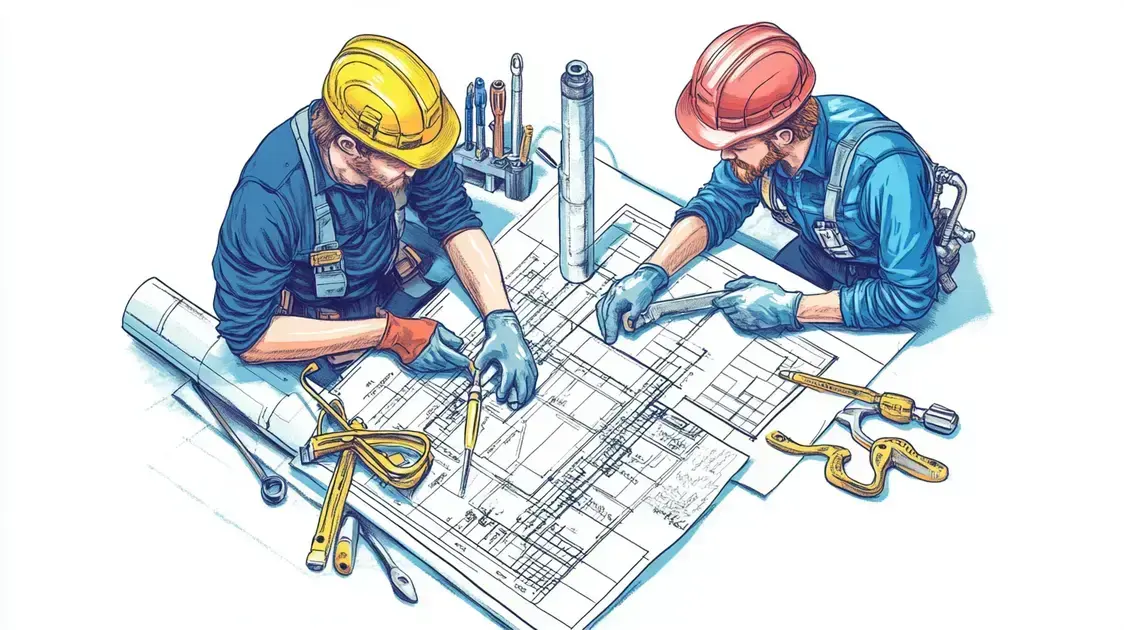Career Change to Plumber can offer a fresh start with great opportunities. The demand for skilled plumbers is high, ensuring stable work and income. This hands-on career can bring a sense of accomplishment every day.
Plumbing also offers flexibility. You can work for a company, start your own business, or specialize in advanced systems. The choice is yours, along with the chance to keep learning as the industry evolves.
Ready to take the leap? Keep reading to find out how you can start your new plumbing career today!
Why Consider a Career Change to Plumbing?
Switching to a career in plumbing might not be the first option that comes to mind, but it offers a wealth of opportunities for those ready to roll up their sleeves and embrace a hands-on, practical profession. The demand for skilled plumbers is consistently high, with industries and households relying on their expertise daily. This ensures stable employment and an ever-present need for their services.
Plumbing also provides the satisfaction of directly solving real-world problems. Whether repairing a broken pipe, installing new systems, or ensuring a home has clean water, plumbers play a crucial role in maintaining essential infrastructure. For career changers, it can be a fulfilling path with a visible impact.
One of the significant advantages of this career change is flexibility. Many plumbers become entrepreneurs, running their businesses and setting their own hours. Transitioning to plumbing could be the perfect step for individuals seeking independence while earning a competitive salary.
Additionally, plumbing often requires continuous learning, embracing new technologies such as eco-friendly systems and advanced diagnostic tools. This helps keep the work fresh and engaging while providing plenty of room for professional growth.
Essential Skills for Becoming a Plumber
Career Change to Plumber requires a combination of technical expertise and practical skills. Mastering these abilities not only ensures quality work but also helps in building trust with clients. Problem-solving skills are at the core of plumbing work.[
Plumbers often face complex challenges, such as diagnosing leaks or designing custom systems, and the ability to think critically and find solutions is invaluable.
Physical dexterity and coordination are equally critical. Plumbers frequently work in tight spaces, requiring precise movements to handle tools and materials effectively. Additionally, a solid understanding of plumbing systems and mechanical concepts ensures the proper installation and maintenance of pipes, valves, and fixtures.
Strong communication skills are vital for discussing project details with customers or collaborating with contractors on larger jobs. Being able to explain technical issues clearly ensures customer satisfaction and reduces misunderstandings.
Another essential skill is attention to detail. Accurate measurements, careful installations, and thorough inspections are necessary to prevent costly mistakes or safety hazards. Plumbers must also stay up to date with modern technologies, such as water-saving devices and advanced diagnostic tools, which are becoming increasingly prevalent in the industry.
Lastly, time management and organizational abilities are important. Managing multiple projects and meeting deadlines ensures efficiency and client trust. For those considering a Career Change to Plumber, focusing on these skills will pave the way for success.
Training and Certifications Needed

Career Change to Plumber requires a mix of formal training and industry-recognized certifications. These qualifications ensure that you have the knowledge and skills to handle the challenges of the job safely and effectively.
One of the most common pathways is completing a trade school program or vocational course in plumbing. These programs cover essential topics such as pipe systems, codes, and safety practices, providing a comprehensive foundation.
Another important step is participating in an apprenticeship, which allows you to gain practical, on-the-job experience under the guidance of experienced plumbers. Apprenticeships typically last 2-5 years, during which you’ll learn advanced techniques, problem-solving skills, and how to use specialized tools effectively.
Certain locations may require you to obtain a license before working independently. License requirements often include passing an exam that demonstrates your understanding of plumbing codes and regulations. This ensures that you can perform your duties while adhering to safety and legal standards.
Certifications can further enhance your credibility and career prospects. For example, earning a Green Plumber certification highlights your expertise in eco-friendly solutions, such as water-efficient systems and sustainable technologies. These certifications distinguish you in a competitive job market.
Finally, ongoing education is vital for staying current with industry trends and technological advancements. Plumbing is a field that evolves with innovations, such as smart plumbing systems, making continuous learning a valuable asset in this profession as you advance after your Career Change to Plumber.
Overcoming Challenges in Changing Careers
Career Change to Plumber can be an exciting yet challenging endeavor, and transitioning to plumbing is no exception. One of the first obstacles many face is leaving the comfort of familiarity. Stepping away from a stable job or an established career path can feel uncertain, but focusing on the potential rewards of this new direction helps to build confidence.
Financial concerns may arise, especially if the career change involves a period of training or reduced income during an apprenticeship. Planning a budget and exploring financial assistance, such as grants or scholarships for vocational training, can help ease the burden. Many aspiring plumbers also work part-time to balance expenses while pursuing certifications.
Another challenge is the learning curve, particularly for individuals unfamiliar with hands-on or technical work. Developing skills in plumbing systems, tools, and local codes takes time and patience. Enrolling in a structured program and seeking mentorship from experienced plumbers are excellent ways to overcome this hurdle.
Building a professional network in a new industry can also be intimidating but is crucial for career growth. Attending trade events, engaging with industry associations, and connecting with peers during training can open doors to new opportunities and valuable guidance.
Lastly, fear of failure or self-doubt can hold individuals back during such major transitions. Focus on small milestones, celebrate achievements, and remember that every skill acquired brings you closer to becoming a successful plumber. A strong support system from family, friends, or mentors can make all the difference in staying motivated throughout a Career Change to Plumber.
Benefits of Being a Plumber
Career Change to Plumber offers numerous benefits that make it an appealing career choice for many. One of the most significant advantages is job security. Plumbing is an essential service, and skilled plumbers are always in demand, regardless of economic conditions. Homes, businesses, and industries all rely on their expertise to maintain functioning water and sewage systems.
The profession also provides excellent earning potential. Plumbers often earn competitive wages, and experienced professionals or those who specialize in certain areas can achieve even higher incomes. Additionally, many plumbers have the opportunity to increase their earnings by working overtime or taking on specialized projects.
Flexible career paths are another key benefit. Plumbers can choose to work for established companies, become independent contractors, or even start their own businesses. This flexibility allows professionals to tailor their careers to suit their personal goals and lifestyles.
The work itself is highly rewarding. Plumbers get to solve real-world problems daily, providing tangible results that improve people’s lives. Fixing leaks, installing systems, or upgrading infrastructures offers a sense of accomplishment that few desk jobs can match.
Another important benefit is the opportunity for ongoing growth. Plumbing is a dynamic field, with new technologies and eco-friendly systems emerging regularly. Staying updated on these advancements ensures long-term relevance and professional growth within the trade.
Finally, plumbing offers physical and mental variety. The work combines technical knowledge with hands-on tasks, preventing the monotony often associated with other professions. For those considering a Career Change to Plumber, this dynamic and impactful field delivers on all fronts.
Salary Expectations as a Plumber

Career Change to Plumber is an appealing option for those seeking financial stability and growth. The average salary for plumbers varies depending on experience, location, and specialization. Entry-level plumbers, such as apprentices, typically start with an hourly wage that increases as their skills and certifications grow.
For a newly licensed plumber, the annual income often ranges from $40,000 to $50,000, but this figure can vary significantly based on the cost of living in their area. Experienced plumbers or those specializing in complex systems, like gas lines or industrial piping, can earn upwards of $70,000 to $90,000 annually. High-demand areas may even offer six-figure salaries to skilled professionals.
Independent plumbers or business owners have the opportunity to earn even more by setting their rates and expanding their client base. However, their income can fluctuate depending on the number of jobs completed and business expenses.
Overtime work and emergency services also boost earning potential. Many plumbers take advantage of jobs that require after-hours or weekend work, which often pays a premium. This additional income can significantly increase yearly earnings while providing flexibility in scheduling.
Furthermore, plumbers who invest in certifications, such as those focused on eco-friendly solutions or advanced systems, can enhance their value in the market. Clients are often willing to pay more for specialized expertise, leading to a higher income.
Overall, plumbing offers a lucrative and stable career path, with opportunities for financial growth through experience, specialization, and entrepreneurship. If you’re considering a Career Change to Plumber, this trade presents great opportunities for success and long-term financial rewards.
Success Stories of Career Changes to Plumbing
Transitioning to a plumbing career has proven transformative for many individuals seeking a fresh start. These success stories highlight the potential for personal growth, financial stability, and professional fulfillment in this hands-on trade.
One inspiring example is a former corporate accountant who found plumbing to be a more rewarding and tangible career. After years at a desk job, he pursued vocational training and an apprenticeship. Today, he owns a thriving plumbing business, enjoying the flexibility to manage his schedule while earning a six-figure income.
Another notable story involves a military veteran who struggled to adapt to civilian work but found a new sense of purpose through plumbing. After completing a certification program, he joined a plumbing company specializing in eco-friendly systems. His problem-solving skills from the military translated seamlessly into his new role, leading to a successful and fulfilling career.
A stay-at-home parent re-entered the workforce by becoming a plumber, drawn by the stability and adaptability the trade offers. By joining an apprenticeship program that accommodated her family obligations, she gradually built experience. Now, she works independently, balancing professional success with her personal life.
Career Change to Plumber from unrelated fields, such as teaching or retail, has also proven successful. One former high school teacher turned her knack for learning into a quick mastery of plumbing systems. She now specializes in installing modern, high-tech plumbing solutions, which command premium rates.
These stories demonstrate that with determination, proper training, and a willingness to embrace a dynamic profession, anyone can succeed in plumbing. Each journey underscores the flexibility and opportunities this rewarding career offers individuals at any stage of life. Career Change to Plumber is not only possible but also offers a future full of potential and personal reward.
FAQ – Frequently Asked Questions About Career Change to Plumber
Why should I consider switching careers to plumbing?
Plumbing offers job stability, hands-on work, and excellent earning potential. The profession is in demand and provides rewarding problem-solving opportunities.
What skills are essential for becoming a plumber?
Key skills include problem-solving, physical dexterity, attention to detail, communication, and an understanding of plumbing systems and tools.
What kind of training and certifications do I need to become a plumber?
You need vocational training, an apprenticeship, and often a license to work independently. Certifications in specialized areas, like eco-friendly plumbing, can enhance your career.
What challenges can I face when changing careers to plumbing?
Common challenges include financial adjustments during training, a learning curve for technical skills, and building a professional network in a new industry.
What are the main benefits of being a plumber?
Plumbing provides job security, excellent earning potential, flexible career paths, personal satisfaction, and the chance to stay current with new technologies.
How much can I expect to earn as a plumber?
Entry-level plumbers typically earn $40,000 to $50,000 per year, while experienced plumbers and specialists can earn $70,000 to $90,000 or more.

